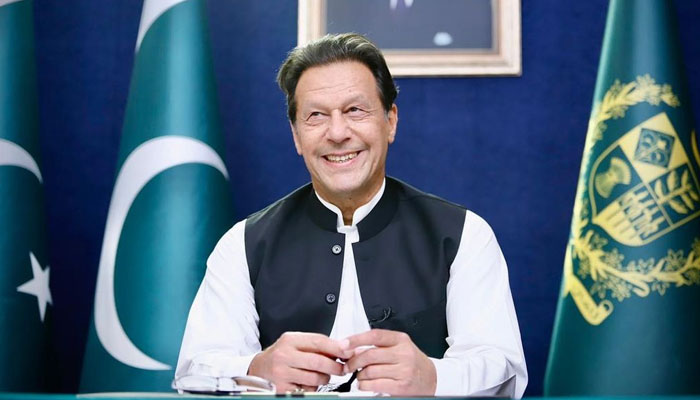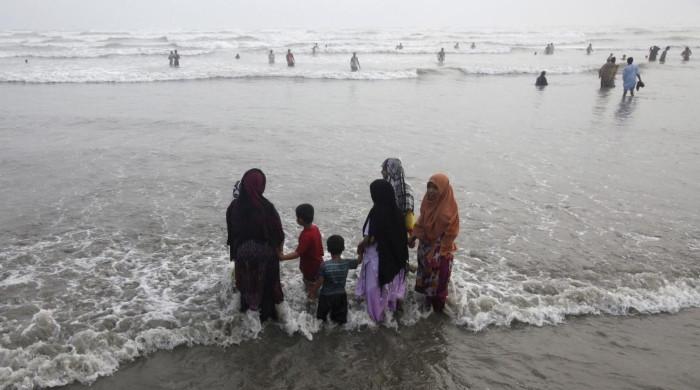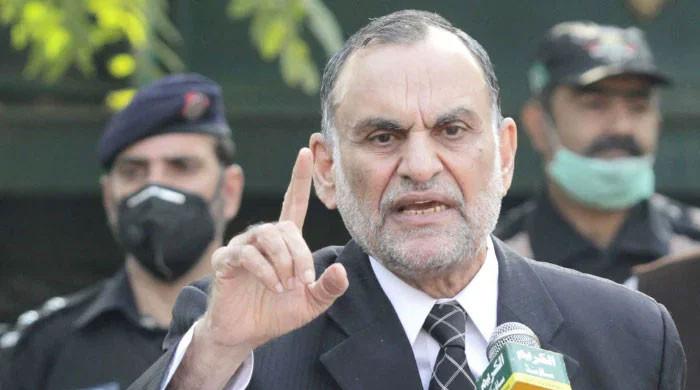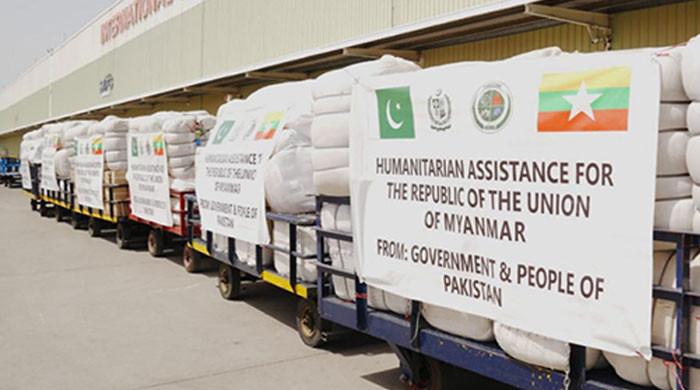I will not accept imported govt, will go to public: PM Imran Khan
PM Imran Khan says apex court should have looked at "threat letter" before issuing verdict; says he would not tolerate installation of "foreign govt" at any cost
April 08, 2022

- PM Imran Khan says he is saddened by SC's decision but has accepted it.
- Says apex court should have looked at "threat letter" before issuing verdict.
- Urges youngsters to take to street, stage 'peaceful protests' to support him.
ISLAMABAD: Prime Minister Imran Khan Friday addressed the nation and said that he will not tolerate the installation of a "foreign government" in Pakistan and that he will turn to the public for support if such a thing happens.
“We are not a nation that can be used like tissue papers,” the premier said during a live telecast, maintaining that Pakistan does not want unilateral relations with any country.
Reiterating his stance on the no-confidence motion, he said that he will never accept an “imported government” and will look up to the public for their decision.
He said: “They [the Opposition] wants to get rid of the corruption cases registered against them.”
The premier further questioned that if they [the Opposition] is so confident, why are they afraid of holding elections?
PM Imran Khan urged the nation to come out of their homes on Sunday after Isha prayers for a peaceful protest.
“All the people should come out of their houses to protest against the ‘foreign-funded drama’ and I will be there with you as I will never accept this foreign conspiracy against Pakistan,” he concluded.
'Saddened by SC's verdict'
The PM said that while he respected the decision of the Supreme Court regarding the restoration of the National Assembly, he is saddened by the verdict.
Recalling the time when he was arrested, the premier said that he strongly believes that the judiciary is the guardian of justice in the country.
Read more: What PM Imran Khan had been saying about SC verdicts?
The premier said that while he respected the country's judiciary, he complained that the Supreme Court should have at least initiated the probe on the “foreign conspiracy” matter.
"I respect the Supreme Court and the judiciary, but the apex court should have looked at the threat letter before issuing the verdict," he said.
PM Imran Khan further complained that the apex court did not take the matter of the “threat letter” as seriously as it should have been taken.
The premier further said that the decision on Article 63 (A), regarding horse-trading, also added to his disappointment.
“The youth of Pakistan is our future and if they see leaders selling their conscience, what precedent are we setting for them?” he asked, adding that even MNAs who came on reserved seats have become sellouts.
He said that nations must stand against wrong, otherwise, nobody can protect them if they don’t raise their voices against the corruption and other evils prevalent in the country.
'Threat letter'
Speaking about the “threat letter”, the premier explained what a cipher is — a coded message sent by embassies to their country — and said that this message cannot be shared with the media and public because if these codes are unveiled, all secret information of Pakistan will be unveiled.
He said that during the meeting between the Pakistani ambassador and the US official, the latter complained that “I [Imran Khan] should not have visited [Russia].”
Read more: Opposition submits no-confidence motion against NA Deputy Speaker Qasim Suri
PM Imran Khan maintained that even before the no-confidence motion was filed against him, the US official had warned the Pakistani ambassador that if Imran Khan manages to save himself from the motion then Pakistan will have to face “severe consequences.”
The premier mentioned that the US official knew beforehand that a no-confidence motion was to be submitted against him, adding that they also knew who would come to power if the Opposition manages to oust him.
Criticising the US official for his arrogance, he said that the official told the ambassador that if Imran Khan is ousted, Pakistan will be spared no matter who takes the charge.
'All this drama is to remove me from power'
PM Imran Khan levelled allegations against PML-N President Shahbaz Sharif and said the had apparently prepared his sherwani for the oath-taking ceremony — as a result of being involved in this “foreign conspiracy.”
“It is so shameful for the 220 million people of Pakistan that a foreign official is ordering the sitting prime minister of the country through a third person, warning of severe consequences and alluring them of forgiveness if I [Imran Khan] leave the office,” he said.
Explainer: The Supreme Court’s ruling and the foreign letter
He further added that when details related to the letter were revealed, it was disclosed that US diplomats were meeting the MNAs. “Two of my own ministers informed me that the US officials knew about the no-confidence motion against me months before it was submitted,” he said, adding that it gradually occurred to him that this was all “pre-planned and scripted.”
Taking a jibe at Shahbaz’s statement regarding “beggars are not choosers”, he said: "It is important for the nation to decide at the moment that do we want to live as — an independent state or do we want to accept slavery.”
“If the West knows anybody in the country, that's me,” he said, elaborating on the reasons why the US is against him.
“When they saw my profile, they realised that I was the one who raised his voice against the drone attacks and the Iraq War,” the premier said, adding that he was the only one who constantly raised his voice against the humanitarian crisis in Afghanistan.
“All this drama is being staged to remove one person [Imran Khan] because the West has realised that they cannot control my actions and I will not become its slave,” he maintained.
Read more: PTI's political committee proposes en masse resignations, say sources
Comparing himself with the bigwigs of the Opposition, PM Imran Khan added that unlike him, these people [PML-N supremo Nawaz Sharif, PML-N President Shahbaz Sharif, and PPP Co-Chairman Asif Ali Zardari] are ready to sacrifice anything in order to save their money.
"That is why they want to come back to power.”
'We need to make a decision now'
The premier went on to say that the nation needs to make a decision right now about what it wants, he said while highlighting practices followed in India. He mentioned that India got its independence from Britain at the same time as Pakistan but still, none of the superpowers has the audacity to speak against it.
“I am not against any country; however, my focus is on the interest of my people. I will first see the betterment of my people and will then look at ties with other countries,” he said.
“When you take money from someone, they do not respect you,” he asserted, adding that the Opposition leaders are dragging the PTI into a “war for dollars.”
Read more: 'Mass resignations' the solution to political turmoil, say Sheikh Rasheed
On Thursday, the Supreme Court of Pakistan restored the National Assembly after it declared the government's decision to dissolve the assembly and NA Deputy Speaker Qasim Suri's ruling against the Constitution.
The top court has ordered National Assembly Speaker Asad Qasier to summon the session on Saturday (April 9) and not later than 10:30am to allow the vote on the no-confidence motion against the premier.
Commission to probe 'threat letter'
Earlier in the day, PM Imran Khan chaired a cabinet meeting, following which Minister for Information and Law Fawad Chaudhry said a commission will be formed that would probe the "threat letter".
The commission would present its report within 90 days after it investigates how many dissident MPs were in contact with foreign powers.
"We have evidence of eight dissident MPAs being in contact with foreign dignitaries," Fawad said, adding: "The commission will look at a connection between local handlers and regime change."
Read more: Lt Gen (retd) Tariq Khan refuses to head commission formed to probe 'threat letter', say sources
He said that the parliamentarians would be briefed regarding the details of the threat letter before the voting on the no-confidence motion.
Speaking about a non-conventional foreign policy adopted by PTI-government since the time it came into power, he said that the foreign policy of the country should first focus on the betterment of its own people.
“We can only lift our people out of poverty if we do not take part in other’s wars,” he said, adding that the West and alleged “foreign conspirators” prefer people who believe that beggars can’t be choosers.
Addressing the country's youngsters, the PM said that the sovereignty of the county is in the hands of the nation as democracy is protected by the people of the country.
No-confidence motion
The prime minister faces being booted from office at the weekend after the Supreme Court's ruling that parliament had been illegally dissolved and a no-confidence vote on his government must go ahead.
PM Imran Khan's coalition lost its majority in the national assembly last week, but he avoided being dismissed when the deputy speaker blocked a no-confidence motion against him and the president dissolved parliament and ordered fresh elections.
The premier claimed the Opposition had colluded with the United States for "regime change" when the deputy speaker — a member of PTI — refused to allow the no-confidence motion.
Read more: No-confidence vote against PM Imran Khan deemed 'unconstitutional'
Simultaneously, Khan asked President Arif Alvi — who is also a PTI loyalist — to dissolve the assembly.
The decision — which the court said was unanimous — was met with jubilation by opposition supporters in the capital, with packed cars racing through the streets, sounding their horns.
There had been high hopes for Khan when he was elected in 2018 on a promise of sweeping away decades of entrenched corruption and cronyism, but he struggled to maintain support with soaring inflation, a feeble rupee and crippling debt.











